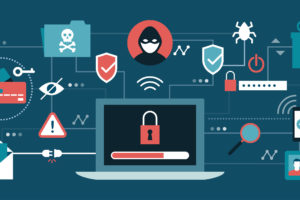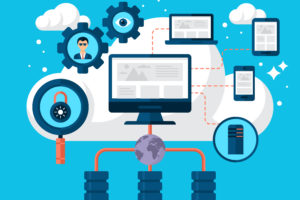Although there have been several arguments about the origins of computer malware, there’s one thing experts can agree on: cyberthreats targeting small- to medium- businesses (SMBs) have gotten worse. Based on Verizon’s 2018 Data Breach Investigation Report, malware keeps growing in complexity and frequency every year.
Despite being an old threat to today’s computer systems, why does malware continue to be a major issue? Let’s take a closer look.
Malware 101
As a portmanteau of malicious software, malware is developed by hackers with the intention of causing damage or gaining access to a computer network. This includes applications created to execute illegal actions on smartphones, tablets, or computers. Here are some specific examples:
- Viruses – These are executable files that make copies of themselves by infecting and changing trustworthy applications.
- Ransomware – This computer program will take control of a computer or mobile device and prevent the user from accessing data until the hackers are paid a ransom, usually in the form of untraceable cryptocurrency.
- Rootkits – Once these programs are installed on a device, they hide from security software and make unauthorized changes to systems or automatically run certain applications.
- Spyware – This program installs itself on a device to secretly steal, track, or collect sensitive information.
- Worms – These are applications that replicate themselves and spread to other machines that are connected to the compromised network.
How does malware interrupt businesses?
These cyberthreats come in different forms, and they can affect business operations in various ways. SMBs that are infected by malware can experience setbacks like reputational damage, stolen or corrupted data, and significant financial losses.
These are some of the ways cybercriminals can disrupt operations:
- Hackers can remotely control an entire network and the devices that connect to it by installing viruses or sending malicious emails.
- Alternatively, they can delete or alter files, possibly reformatting a device’s hard drive so that any data that is not backed up will be lost completely.
- Hackers steal personal information and financial data, including social security numbers and credit card data, and subsequently sell them in the dark web for a profit.
- Some cyber criminals infect computers to force their web browsers to display annoying or malicious advertisements, or worse yet, to install ransomware.
What can your company do to repair the damage from malware?
Thanks to news reports, social media, and word of mouth, most enterprises are now aware of how dangerous malware is. The challenge for SMBs is to find ways to keep these cyber threats at bay during regular hours as well as nights, weekends, and holidays.
There are so many big and little things to consider. Did you know that hackers can hide malware inside a Word document? They exploit a feature called macros and it’s often best to disable that feature on all your employee’s computers.
Dependable managed services providers (MSPs) like Vodigy Networks offer solutions to simplify the sprawling number of issues and vulnerabilities you need to manage. For example, MSPs can whitelist and blacklist certain applications to prevent a malware infection. It’s a simple solution, but one that takes a fair amount of time and expertise to set up.
Work with an MSP to keep malware away
Getting rid of cyber threats should always be a priority for any company, and antimalware software alone isn’t enough. Hackers are getting smarter, so you must employ a multi-pronged security strategy that is constantly monitored and supported. That usually requires at least two technicians, which is why partnering with an MSP is often the preferred alternative for SMBs.
Vodigy Networks offers proactive, stress-free managed IT service solutions for clients in the Minneapolis-St. Paul area. We’ll give you peace of mind by employing various solutions and protocols for keeping your computers and network safe from malware. We look forward to hearing from you. Get in touch with us today.




